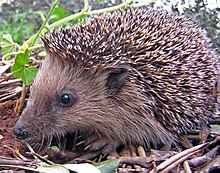Erinaceidae
Erinaceidae is a family in the mammalian order Eulipotyphla. It contains the well-known hedgehogs of Eurasia and Africa and the moonrats of South-east Asia. This family was once in the order Insectivora, but that order is not used anymore.
| Erinaceidae Temporal range: Eocene to Recent
| |
|---|---|

| |
| Erinaceus europaeus | |
| Scientific classification | |
| Kingdom: | |
| Phylum: | |
| Class: | |
| Infraclass: | |
| Superorder: | |
| Order: | |
| Family: | Erinaceidae G. Fischer, 1814
|
Characteristics
changeErinaceids are generally shrew-like in form, with long snouts and short tails, but they are much larger than shrews. All but one species have five toes in each foot (in some cases with strong claws for digging) and they have large eyes and ears. Hedgehogs have hair modified into sharp spines to form a protective covering over the upper body and flanks, while gymnures have only normal hair. Most species have anal scent glands, but these are far better developed in gymnures, which can have a powerful odor.[1]
Erinaceids are omnivorous, with the major part of their diet consisting of insects, earthworms, and other small invertebrates. They also eat seeds and fruit, and occasionally bird's eggs, along with any carrion they come across. Their teeth are sharp and suited for impaling invertebrate prey. The dental formula for erinaceids is: upper=2-3.1.4.3; lower=3.1.2-4.3.
Hedgehogs are nocturnal, but gymnures are less so. Many species live in simple burrows, while others build temporary nests on the surface from leaves and grass, or shelter in hollow logs or similar hiding places. Erinaceids are solitary animals outside the breeding season, and the father plays no role in raising the young.[1]
Female erinaceids give birth after a gestation period of around six to seven weeks. The young are born blind and hairless, although hedgehogs begin to sprout their spines within 36 hours of birth.
Classification
changeThere are 10 genera and 24 species of erinaceid.
- ORDER ERINACEOMORPHA
- Family Erinaceidae
- Subfamily Erinaceinae (Hedgehogs)
- Subfamily Galericinae (Gymnures, or Moonrats)
- Family Erinaceidae
References
change- ↑ 1.0 1.1 Wroot, Andrew (1984). Macdonald, D. (ed.). The Encyclopedia of Mammals. New York: Facts on File. pp. 750–757. ISBN 0-87196-871-1.